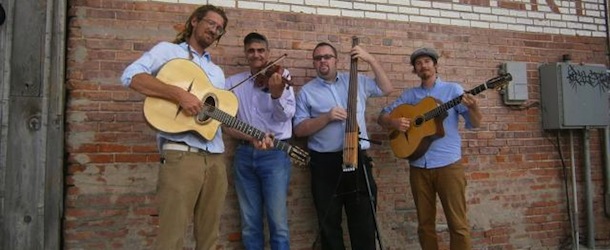Brandon Raby travels from his home in North Platte, Neb., to Northampton, Mass., every year to attend Django in June. This pilgrimage is to a camp that celebrates and studies gypsy jazz music, a style born in the 1930s by guitarist Django Reinhardt.
Gypsy jazz is extremely rare in Nebraska. In fact, Raby says that as far as he knows, his band, Blue Swing, is the only gypsy jazz band in Nebraska. Still, as Skate the State rolled through North Platte last year, they found Raby, owner of Caravan Skate Shop, and enjoyed a couple performances of gypsy jazz.
As of early Friday afternoon, Skate the State 2 is on day three and already past North Platte. They didn't catch Raby this time around as he's still in Massachusetts studying with and learning from fellow gypsy jazz enthusiasts, but Hear Nebraska caught up with him and talked his favorite genre, his musical background and what this yearly trip means to him:
Hear Nebraska: What got you interested in learning about gypsy jazz?
Brandon Raby: I’m not quite sure what it was. I think I came across a Django Reinhardt album, and I’ve always been obsessed with geniuses. His guitar blew me away. I became extremely passionate about gypsy jazz music.
HN: Have you always had a music-heavy life, or is gypsy jazz just a specific type of music you enjoy?
BR: Yeah, I grew up around music. My father was a traveling musician; he learned the hard way being poor, traveling and playing anywhere he could. I traveled with him sometimes and now my brother, and I and lot of my friends all play music.
HN: So what exactly is gypsy jazz music?
BR: It’s a fusion of classic American jazz from the early 1900s and traditional gypsy sounds from around Europe. The music has been passed down from generation to generation. It’s like American jazz with a French accent. Gypsy jazz was founded by Django Reinhardt in the early 1930s.
HN: Why is Massachusetts a good place to learn about gypsy jazz?
BR: It’s the only place that has a camp dedicated to the study of this music. Andrew Lawrence is the guy who puts the camp on. It’s close to New York, and there are a lot of fantastic players of this style of music there. A lot of international musicians also come over to play.

HN: Who do you learn from when you go to Massachusetts?
BR: Every year the camp has different artists to teach and perform. A couple guys have been there every year that are international superstars. There is a phenomenal musician from Montreal and one from Argentina.
HN: What have you learned so far about gypsy jazz by going to Django in June?
BR: The cliché that music is a universal language. You can go anywhere in the world, and anyone who plays gypsy jazz can communicate in the same language. I’ve also learned about how technically virtuosic it can be; it’s very difficult to play the music because it requires specific technique that has been passed down. It’s funny because these gypsies don’t study music educationally, yet their music has a lot of music theory involved.
HN: What does this annual trip to Massachusetts mean to you?
BR: It’s important to me because I’m so passionate about the music, and I want to further my education in it. I want to progress and get better at it. I’ve also made a lot of friendships up there. There isn’t a lot of gypsy jazz in Nebraska, so I go to the best place to learn about it.
Kelsey Haugen is a Hear Nebraska intern. She is interested in listening to some gypsy jazz music after hearing about it for the first time. Reach her at kelseyh@hearnebraska.org.




